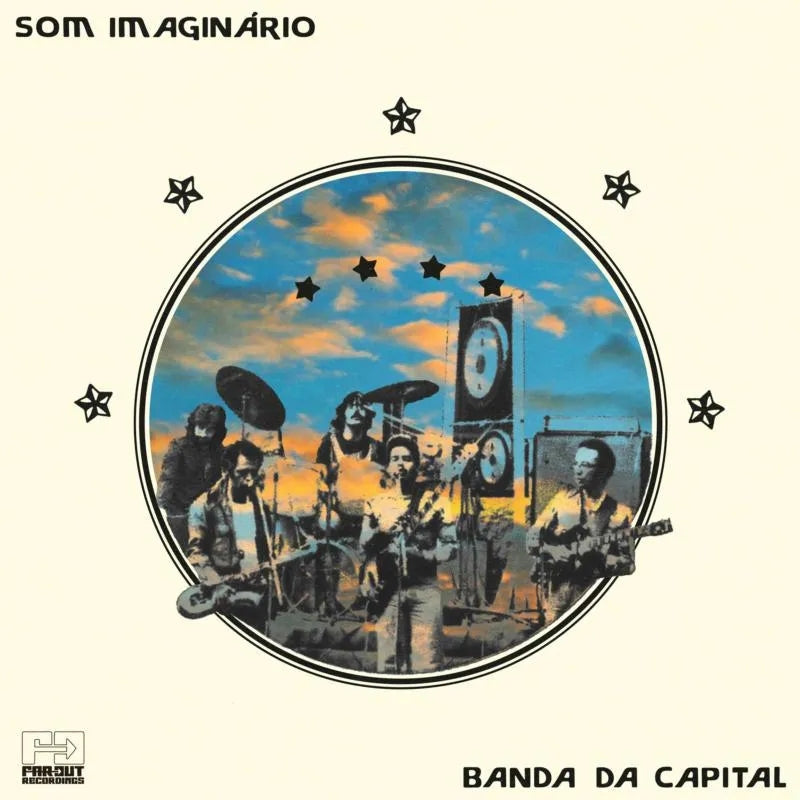
Banda Da Capital (Live in Brasilia, 1976)
Som Imaginario are the stuff of MPB mythos. Integral to Brazil's Clube Da Esquina movement in the early 1970s, a heady blend of progressive rock, folk, psychedelia, jazz and traditional Brazilian rhythm flows through the three studio albums the band recorded between '70 and '73.
Artist: Som Imaginario
Genre: Jazz
Label: Far Out Recordings
Release date:
Flying the countercultural freak-flag amid the context of military dictatorship, the Brazilian prog lords shared much of the sense of experimentation and bountiful fuzz bequeathed by their tropicalismo forbearers. But armed with genius composers, arrangers and stupendously high-level musicianship, Som Imaginario introduced a potent harmonic complexity to Brazilian popular music, which would inspire generations of artists to come. On 4th October 1976, having finished a spell of recording and touring with Milton Nascimento, Som Imaginario performed a concert in celebration of Nature Day in Brasilia. The recordings of the show would become "Banda Da Capital", which, for the past half century, has laid dormant, waiting for its mystical power to be untapped. In the band that day were original members Wagner Tiso and Fredera, joined by Nivaldo Ornelas, Paulinho Braga and Jamil Joanes. Operating within such a hugely creative and free-spirited scene meant line-up fluctuations were inevitable and former Som Imaginario members also include Laudir de Oliveira (who left to join Chicago), Nana Vasconcelos (who also moved to work in the US), Ze Rodrix, Robertinho Silva, Novelli and Toninho Horta. Titled after the Belo Horizonte radio station where they would practice during their youth, the show opens with "Radio Guarany", an improvisation led by Paulinho Braga and Nivaldo Ornelas. The track morphs into Nivaldo Ornelas' composition "Xa Mate", which also opens Milton Nascimento's Milagre dos Peixes ao Vivo album, featuring Som Imaginario and a 32 piece orchestra. Having grown up together in Minas Gerais, composer, arranger and keyboard player Wagner Tiso had been another close musical partner of Milton Nascimento's. Some of their work together includes many of Bituca's most beloved albums, including Clube Da Esquina, Milton Nascimento (1970) and Maria Maria / Ultimo Trem, as well as Native Dancer: Nascimento's album with Wayne Shorter. Explaining the inspiration behind two of the tracks on Banda Da Capital "Igreja Majestosa" (written with Nivaldo Ornelas) and "Os Cafezais sem fim", Tiso remincies: "On Sundays I used to watch the coffee plantation workers entering the church. I'd see them working all week, in their humble, dirty clothes. But I was always enchanted by their immaculate dress on Sundays. Taken from a line in a poem by my father, which became the hymn of the city of Tres Pontas, the song "the majestic church and the endless coffee plantations " became sacred for me, because it came from something joyful, from the workers." One of the album's most tender moments is a beautiful rendition of the post-tropicalista folk-rock classic "Sabado", written by Fredera for Som Imaginiaro's debut album. The lyrics are typical of the "desbunde": those on the Brazilian left whose response to authoritarianism was a politics of pacifist, often psychedelic, non-conformity (similar to that of "dropping out" in the US)... "Eu quero o ceu e vou com guizos nos sapatos / Minha roupa em farrapos coloridos vou rasgar / E vou dancar entre os cristais azuis do tempo e esquecer" "I want the sky and will go with bells on my shoes / I will tear my clothes into colourful rags / And I will dance among the blue crystals of time to forget". Jamil Joanes, best known as a member of Banda Black Rio, is another Minas Gerais native. His composition for the album is "Imaginados", a stunning unplugged guitar and vocal performance, highlighting Som Imaginario's south-eastern home state's influence on their sound. The CD and digital release of Banda Da Capital feature two bonus tracks from a separate concert at Museu de Arte Moderna, in Rio de Janeiro, on October 6th 1975.
About the artist
Som Imaginário, were founded by Wagner Tiso, Robertinho Silva and others, offered an almost boundaryless sound that effortlessly wed jazz, classical and rock (progressive and psychedelic), MPB and bossa nova. Following their appearance on Nascimento's Milton in 1970, they issued an eponymous offering on Odeon.
- In stock, ready to ship
- Backordered, shipping soon
This Vinyl product is a:
- Standard Pressing

